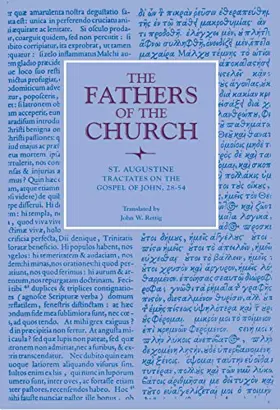

Tractates on John, Volume 3 (28–54)
Pages
326
Publisher
Catholic University of America Press
Published
1/1/1993
ISBN-13
9780813226231
In his preaching, St. Augustine developed an oratorical style based on the classical rhetoric he had learned prior to his conversion which he adapted to the unique demands of Christian preaching. He still recognized the classical ends of rhetoric: to teach, to please, and to persuade. He gave, however, the place of most importance to content: what was said was more important than how it was said. He eschewed the more elaborate figures of speech, using a more direct manner to educate an audience that was, to a great extent, illiterate. The result, however, is not a debased Ciceronian style but a method of preaching that is clear, lively, and well-suited to its purpose.
Just as Augustine's oratorical style was subordinated to the demands of preaching the gospel of Christ, so also his method of commentary was similarly influenced by his duty as pastor at Hippo to instruct his flock in matters of faith and morals. His commentary, then, contains more than exegesis. His reflections on Scripture lead him to discussions of both moral action and dogma.
Augustine's extemporaneous style and broad range of interests are evident in the tractates included in this volume, in which he comments on chapters 7-12 of St. John's Gospel. These chapters contain some of the best-known episodes from the life of Christ: the encounter with the woman caught in adultery, the healing of the man born blind, the raising of Lazarus from the dead, Mary's anointing of Christ's feet, and Christ's triumphant entrance into Jerusalem. The passages also contain some of Christ's most explicit teaching of his divinity. In unfolding the mysteries contained in these chapters of St. John, Augustine moves easily from exegesis to reflections on moral virtue and doctrine, especially the Trinity and the Incarnation. But he never loses sight of his audience. Even in his comments on the loftiest of ideas, he strives to make the teaching accessible to all.
These tractates, then give us a glimpse of the man that we do not often get from his other works. Augustine's preaching shows us not only his brilliant mind and rhetorical skills as he expounds upon the Scriptures but also the great love he had for Christ and for the faithful entrusted to his care.
Just as Augustine's oratorical style was subordinated to the demands of preaching the gospel of Christ, so also his method of commentary was similarly influenced by his duty as pastor at Hippo to instruct his flock in matters of faith and morals. His commentary, then, contains more than exegesis. His reflections on Scripture lead him to discussions of both moral action and dogma.
Augustine's extemporaneous style and broad range of interests are evident in the tractates included in this volume, in which he comments on chapters 7-12 of St. John's Gospel. These chapters contain some of the best-known episodes from the life of Christ: the encounter with the woman caught in adultery, the healing of the man born blind, the raising of Lazarus from the dead, Mary's anointing of Christ's feet, and Christ's triumphant entrance into Jerusalem. The passages also contain some of Christ's most explicit teaching of his divinity. In unfolding the mysteries contained in these chapters of St. John, Augustine moves easily from exegesis to reflections on moral virtue and doctrine, especially the Trinity and the Incarnation. But he never loses sight of his audience. Even in his comments on the loftiest of ideas, he strives to make the teaching accessible to all.
These tractates, then give us a glimpse of the man that we do not often get from his other works. Augustine's preaching shows us not only his brilliant mind and rhetorical skills as he expounds upon the Scriptures but also the great love he had for Christ and for the faithful entrusted to his care.